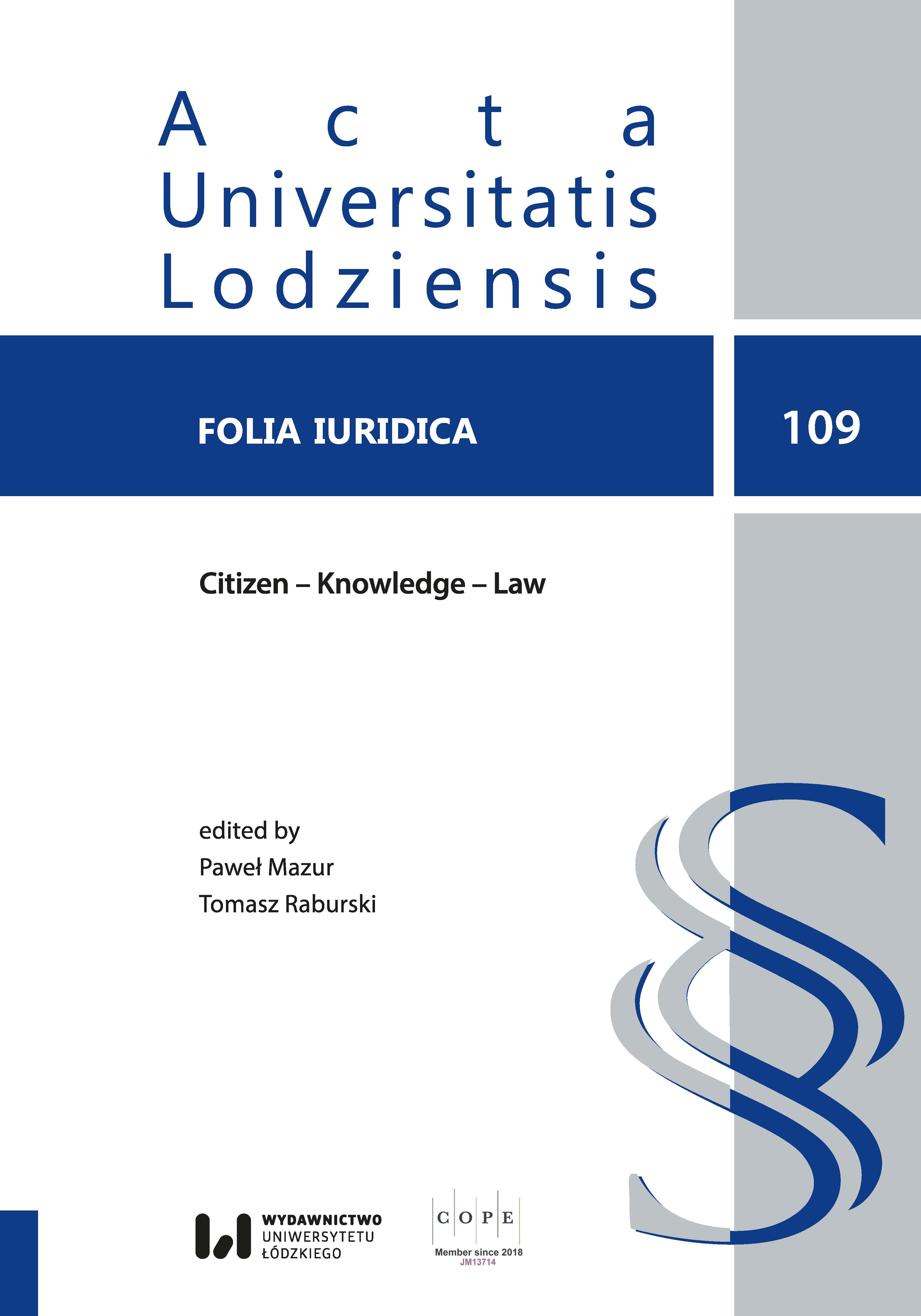Legal Positivism, AI, and the Modern Legal Landscape: Challenges in Education, Research, and Practice
DOI:
https://doi.org/10.18778/0208-6069.109.02Keywords:
Artificial Intelligence, legal positivism, legal professions, legal education, Hans Kelsen, Herbert Lionel Adolphus HartAbstract
In a world that is constantly evolving and modernising, new technologies and automation mean rapid progress in many areas of society, including law. This article aims to discuss whether artificial intelligence will have an impact on legal positivism by influencing the legal profession. This study will first discuss the foundations of legal positivism and the reasons for its crisis and criticism. It will then explore how AI is influencing legal education, research, and legal practice. Finally, it will draw conclusions and indicate how AI is affecting the development of positivism or the stagnation of this legal theory.
Downloads
References
Angwin, Julia. Jeff Larson. Surya Mattu. Lauren Kirchner. 2016. “Machine Bias. There’s software used across the country to predict future criminals. And it’s biased against blacks.“ ProPublica, 23 May. https://www.propublica.org/article/machine-bias-risk-assessments-in-criminal-sentencing.
Google Scholar
Arlauskas, Saulius. 2009. “Jurisprudencijos moksliškumo kriterijai šiuolaikinėje teisės filosofijoje.” Jurisprudencija 4(118): 247–264.
Google Scholar
Ashley, Kevin. 2017. Artificial Intelligence and Legal Analytics: New Tools for Law Practice in the Digital Age. Cambridge: Cambridge University Press. https://doi.org/10.1017/9781316761380
Google Scholar
DOI: https://doi.org/10.1017/9781316761380
Babayan, Arpine. 2019. “Ar dirbtinis intelektas bando užimti teisėjo vietą?“ Teise.pro, 19 January. http://www.teise.pro/index.php/2019/02/01/ar-dirbtinis-intelektas-bando-uzimti-teisejo-vieta/
Google Scholar
Barak, Aharon. 2006. “Teisėjo vaidmuo demokratinėje valstybėje.“ Konstitucinė jurisprudencija 1: 291–306.
Google Scholar
Biresaw, Samuel Maireg. 2022. “The Impacts of Artificial Intelligence on Research in the Legal Profession.” International Journal of Law and Society 5(1): 53–65. https://doi.org/10.11648/j.ijls.20220501.17
Google Scholar
DOI: https://doi.org/10.11648/j.ijls.20220501.17
Buchanan, Bruce. Headrick Thomas. 1970. „Some Speculation about Artificial Intelligence and Legal Reasoning“. Stanford Law Review, 23(1): 40–62. https://doi.org/10.2307/1227753
Google Scholar
DOI: https://doi.org/10.2307/1227753
Cass, R. Sunstein. 2001. “Of Artificial Intelligence and Legal Reasoning.” Uni. Chicago Public Law & Legal Theory Working Papers no. 18: 1–10. https://doi.org/10.2139/ssrn.289789
Google Scholar
DOI: https://doi.org/10.2139/ssrn.289789
Chas, Carmen. 2023. “Morgenthau’s Critique of Legal Positivism: Politics, Justice, and Ethics in International Law.” Jus Cogens 5: 59–84. https://doi.org/10.1007/s42439-023-00076-x
Google Scholar
DOI: https://doi.org/10.1007/s42439-023-00076-x
Clio. 2023. “What is AI and How Can Law Firms Use it?” https://www.clio.com/resources/ai-for-lawyers/lawyer-ai/
Google Scholar
Collenette, Joe. Katie Atkinson. Trevor Bench-Capon. 2023. “Explainable AI tools for legal reasoning about cases: A study on the European Court of Human Rights.” Artificial Intelligence 317: 103861. https://doi.org/10.1016/j.artint.2023.103861
Google Scholar
DOI: https://doi.org/10.1016/j.artint.2023.103861
Council of Europe European Commission for the efficiency of justice. 2023. “Possible use of AI to support the work of courts and legal professionals.” https://www.coe.int/en/web/cepej/tools-for-courts-and-judicial-professionals-for-the-practical-implementation-of-ai
Google Scholar
European Parlament. 2023. “AI rules: what the European Parliament wants.” 20 June. https://www.europarl.europa.eu/news/en/headlines/society/20201015STO89417/ai-rules-what-the-european-parliament-wants
Google Scholar
Fornasier, Mateus de Oliveira. 2021. “Legal education in the 21st century and the artificial intelligence.” Revista Opinião Jurídica 19(31): 1–32. https://doi.org/10.12662/2447-6641oj.v19i31.p1-32.2021
Google Scholar
DOI: https://doi.org/10.12662/2447-6641oj.v19i31.p1-32.2021
Georgieva, Kristalina. 2024. “AI Will Transform the Global Economy. Let’s Make Sure It Benefits Humanity.“ IMF Blog, 14 January. https://www.imf.org/en/Blogs/Articles/2024/01/14/ai-will-transform-the-global-economy-lets-make-sure-it-benefits-humanity
Google Scholar
Harari, Yuval Noah. 2018. 21 pamoka XXI amžiui. Vilnius: BALTO print.
Google Scholar
Hart, Herbert Lionel Adolphus. 1997. Teisės samprata. Vilnius: Pradai.
Google Scholar
Hildebrandt, Mireille. 2020. Law for Computer Scientists and Other Folk. Cambridge: Oxford University Press. https://doi.org/10.1093/oso/9780198860877.001.0001
Google Scholar
DOI: https://doi.org/10.1093/oso/9780198860877.001.0001
International Bar Association. 2022. Guidelines and Regulations to Provide Insights on Public Policies to Ensure Artificial Intelligence’s Beneficial Use as a Professional Tool. N.d.: Vasin Lee/Shutterstock.
Google Scholar
Judicial Council of California. 2020. “Language Need and Interpreter Use Study.” 20 March. 2020-Language-Need-and-Interpreter-Use-Study-Report-to-the-Legislature.pdf (ca.gov).
Google Scholar
Juškevičiūtė-Vilienė, Agnė. 2020. “Elektroninis teisingumas ir konstitucinė asmens teisė į teismą.“ Acta Universitatis Lodziensis. Folia Iuridica 93: 117–136. https://doi.org/10.18778/0208-6069.93.08
Google Scholar
DOI: https://doi.org/10.18778/0208-6069.93.08
Kaufman, Whitley R.P. 2023. Beyond Legal Positivism The Moral Authority of Law. Cham: Springer. https://doi.org/10.1007/978-3-031-43868-4
Google Scholar
DOI: https://doi.org/10.1007/978-3-031-43868-4
Kelsen, Hans. 2002. Grynoji teisės teorija. Vilnius: Eugrimas.
Google Scholar
Kondratas, Justinas. 2018. “Dirbtinis intelektas teisininkų darbe.” Cobalt, 12 October. https://www.cobalt.legal/lt/news-cases/dirbtinis-intelektas-teisininku-darbe/?gad_source=1&gclid=Cj0KCQiAm4WsBhCiARIsAEJIEzX2hVbiqOVQMWyWDS_rXaGvGBE0Fbo3CGbCnUG1r7HcSXPXLw8iHaEaAo9QEALw_wcB
Google Scholar
Krausova, Alzbeta. 2017. “Intersections between Law and Artificial Intelligence.” International Journal of Computer 27(1): 55–68.
Google Scholar
Luban, David. 2007. Legal Ethics and Human Dignity. Cambridge: Cambridge University Press. https://doi.org/10.1017/CBO9780511487484
Google Scholar
DOI: https://doi.org/10.1017/CBO9780511487484
Lynch, Shana. 2017. “Andrew Ng: ‘Why AI Is the New Electricity.” Stanford Business, 11 March. https://www.gsb.stanford.edu/insights/andrew-ng-why-ai-new-electricity
Google Scholar
McConville, Mike. Wing Hong (Eric) Chui. 2007. Research Methods for Law. Edinburgh: Edinburgh University Press.
Google Scholar
Mok, Aaron. 2023. “ChatGPT is getting an upgrade that will make it more up to date.” Business Insider, 6 November. https://www.businessinsider.com/open-ai-chatgpt-training-up-to-date-gpt4-turbo-2023-11
Google Scholar
Murauskas, Donatas. 2020. “Dirbtinis intelektas priimant teismo sprendimą – algoritmų klasifikavimas remiantis teisinio kvalifikavimo stadijomis.” Teisė 115: 55–69. https://doi.org/10.15388/Teise.2020.115.4
Google Scholar
DOI: https://doi.org/10.15388/Teise.2020.115.4
Searle, John. 2002. “Can Computers Think?” In Philosophy of Mind: Classical and Contemporary Readings. Edited by Chalmers David. 669–679. New York: Oxford University Press.
Google Scholar
Smith, Adam. Anastasia Moloney. Avi Asher-Schapiro. 2023. “AI in the courtroom: Judges enlist ChatGPT help, critics cite risks.” The Christian Science Monitor, 30 May. https://www.csmonitor.com/USA/Justice/2023/0530/AI-in-the-courtroom-Judges-enlist-ChatGPT-help-critics-cite-risks.
Google Scholar
Smith, Steven. 2023. “The Fourth Industrial Revolution and Legal Education.” Georgia State University Law Review 39(2): 339–398.
Google Scholar
Supreme Court of Victoria. n.d. Technology in Civil Litigation. Practice Note SC Gen 5. https://www.supremecourt.vic.gov.au/sites/default/files/2018-10/gen_5_use_of_technology_first_revision.pdf (accessed: 1.12.2023).
Google Scholar
Surden, Harry. 2019. “Artificial Intelligence and Law: An Overview.” Georgia State University Law Review 35: 1306–1337.
Google Scholar
Susskind, Richard. 2010. The End Of Lawyers? Rethinking The Nature Of Legal Services. Oxford: Oxford University Press.
Google Scholar
Susskind, Richard. 2017. Tomorrow’s Lawyers: An Introduction To Your Future. Oxford.
Google Scholar
Teise.pro. 2019. “Teisėjas ir dirbtinis intelektas: ar kūrinys gali būti pranašesnis už kūrėją? 12 December. http://www.teise.pro/index.php/2019/12/11/teisejas-ir-dirbtinis-intelektas-ar-kurinys-gali-buti-pranasesnis-uz-kureja/
Google Scholar
UNESCO. n.d.. “Explore the Gendering of AI Voice Assistants.” https://en.unesco.org/EQUALS/voice-assistants (accessed: 1.12.2023).
Google Scholar
Waisberg, Noah. Aleksander Hudek. 2021. AI For Lawyers: How Artificial Intelligence is Adding Value, Amplifying Expertise, and Transforming Careers. Hoboken: Wiley & Sons.
Google Scholar
Published
Versions
- 2024-12-30 (2)
- 2024-12-30 (1)
How to Cite
Issue
Section
License

This work is licensed under a Creative Commons Attribution-NonCommercial-NoDerivatives 4.0 International License.














